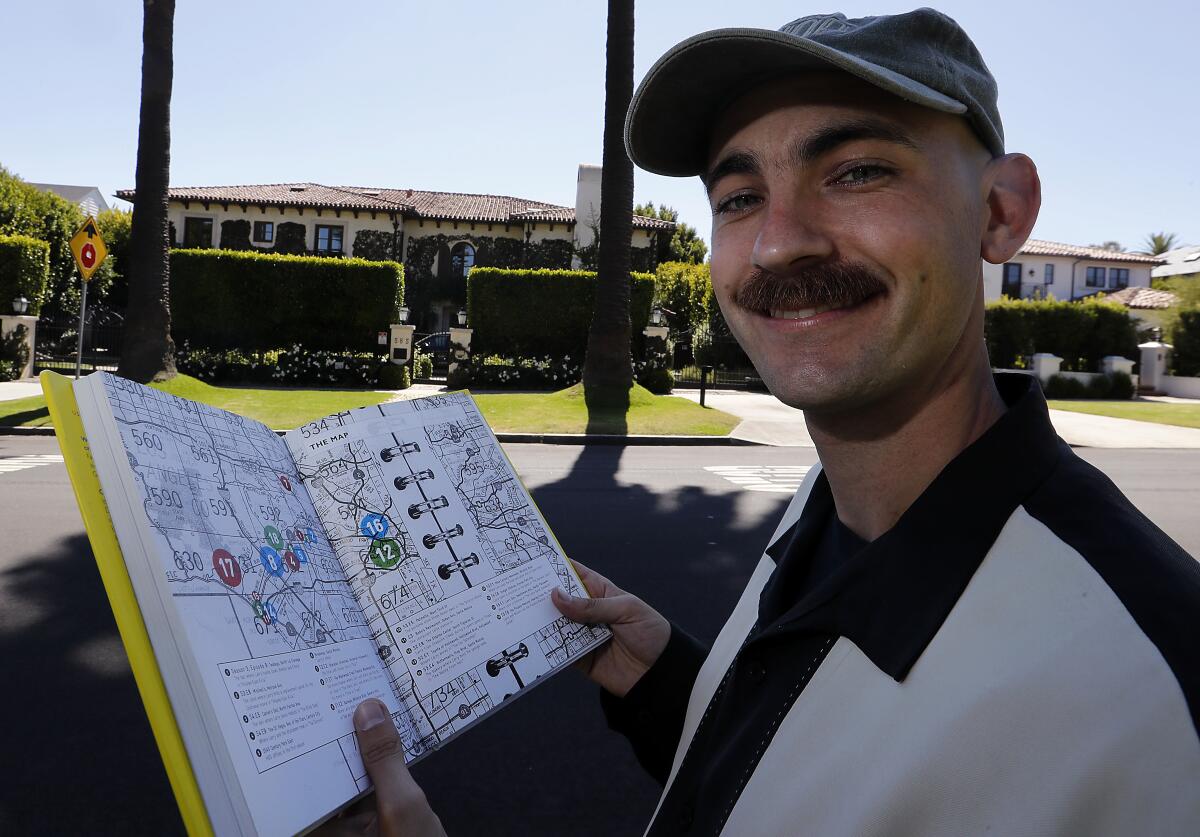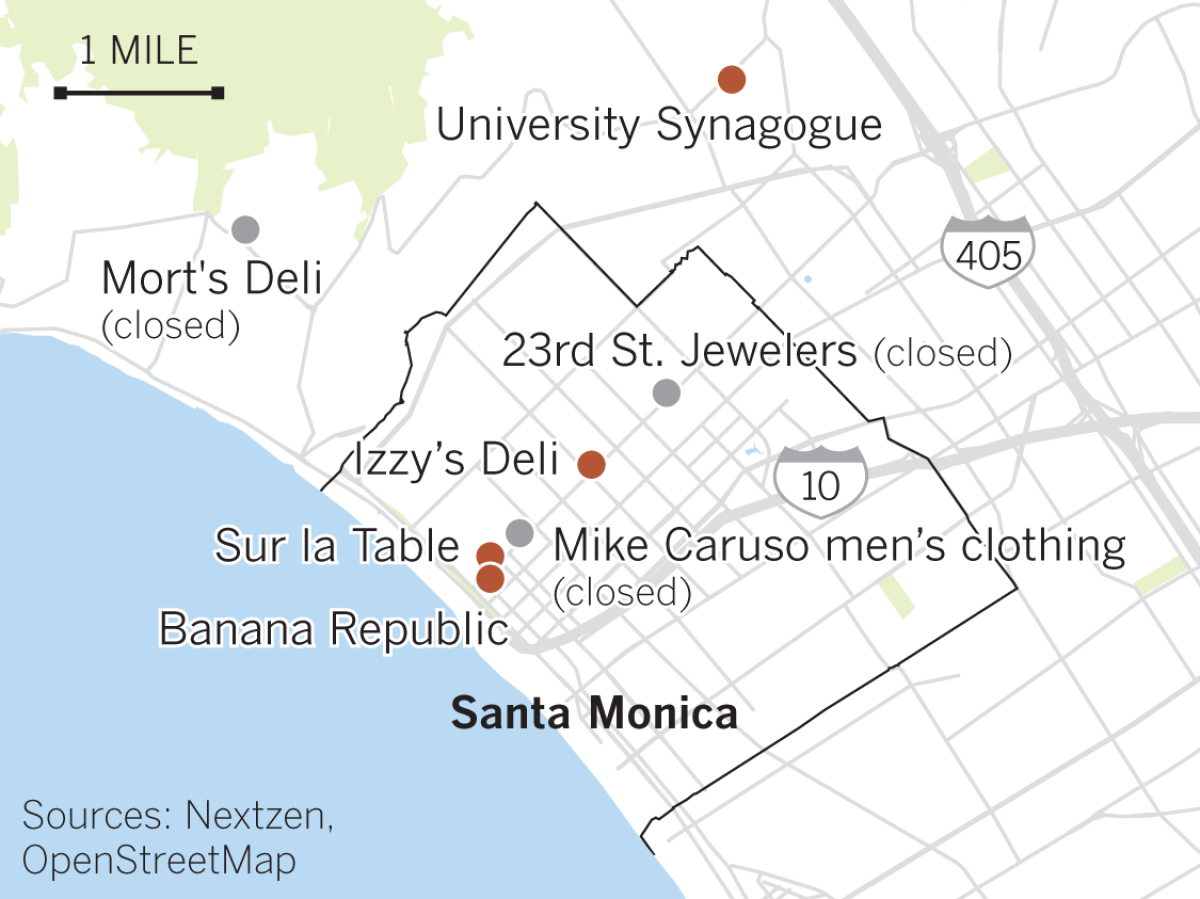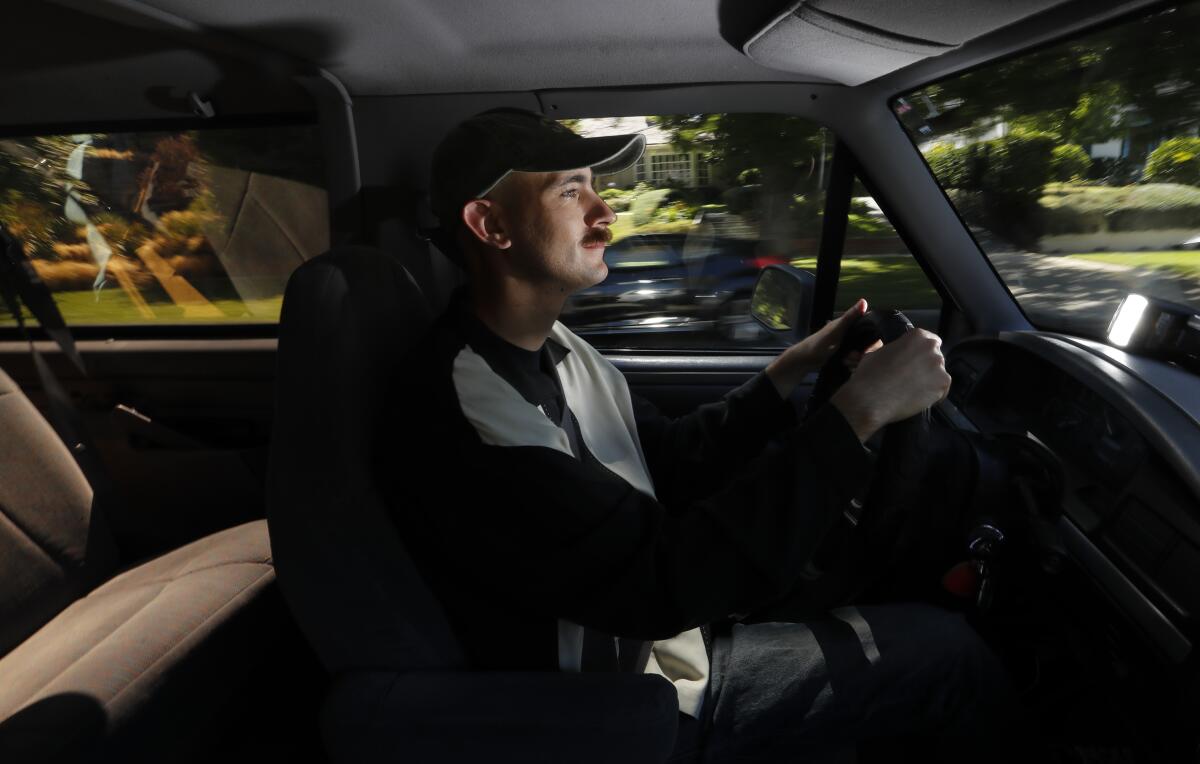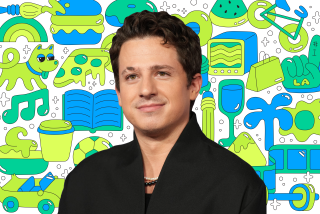Want to experience Larry David’s Los Angeles? There’s a tour for that

Cruising down Wilshire Boulevard in Santa Monica, Adam Papagan points out a few local landmarks: “Over here on the right, Sur La Table — this is where Larry goes to replace the slow toaster, and he accidentally offends Tim Meadows’ deaf wife.”
Papagan then diverts attention to the other side of the street: “And the Banana Republic here — that’s where Larry is trying on pants and the fire alarm goes off, and he leaves wearing the pants, but when he goes back wearing the pants they’ve gotten rid of his original pants, so he thinks he’s owed pants.”
Playing in the background is the “Curb Your Enthusiasm” soundtrack, because the “Larry” in question is Larry David — and because Papagan’s leading a “Curb Your Enthusiasm” tour. Its title? “Curb Tour Enthusiasm,” naturally.
For $35, Papagan will pick you up in Brentwood in a white Ford Bronco — the signature of his Cool L.A. Tours business is “The O.J. Tour,” so he crowdfunded the vehicle for a more… immersive effect — and spend an hour showing you L.D.’s L.A.
You’ll gawk at luxurious homes, sure — including one of the character’s fictional mansions — but unlike a TMZ Celebrity Tour, the emphasis here is on ordinary businesses and other locations rather than private residences. Buildings where Larry goes to the doctor, for instance (which he does a lot). Restaurants where Larry meets friends Jeff and Richard for lunch (which they also do a lot).
“A great thing about the show is that it documents these stores and stuff that are not notable for any reason,” Papagan says. “The majority of the places we’re going are just, like, a restaurant, an office building. It’s nothing.”
Larry David is an acquired taste. For some of us, it takes about 10 seconds.
Papagan, a Brentwood native, leads the tour — and drives the Westside streets — with a local’s knowledge and confidence. “I’ve always felt an extra level of appreciation for the show, growing up on the Westside,” he says, “knowing, like, ‘Oh yeah, Larry would go there!’”
Sitting in a booth at Izzy’s Deli on Wilshire Boulevard and 15th Street in Santa Monica — where Larry meets with the head of the Kidney Consortium, posing as a fellow Orthodox Jew in the hopes of not having to donate one of his kidneys to Richard — Papagan orders a beef-tongue sandwich for a post-tour lunch. “Was that too ‘Curb’ of an order?” he asks with a laugh.
Even out of tour-guide mode, he’s earnest and boisterous, talking about what he does and why “Curb” is part of it. He recalls the time he met David at a bowling alley when he was in ninth grade (“I said, ‘Hey, can I have your autograph?’ and he said, ‘What, are you kidding me?’”) and wonders how the show manages to sneak a philosophical punch in with its comic one (“It’s easier to pull a lesson about how to navigate the world out of this than out of, like, a Marvel movie”).
“Larry has said multiple times that he thought he would go out to L.A., do eight episodes or whatever [of ‘Seinfeld’] and get canceled,” Papagan notes. “And then it turns into the biggest show of all time.” At this point, he starts humming the main theme to “Curb.” “I think we can all relate to that. You’re working and punching the clock — then good fortune smiles on you and you’re rich, which is what everyone wants. It’s the American dream: homeownership in Brentwood.”

Using the wealthiest neighborhoods of the city as a canvas, “Curb” skirts the issue that dictates life for so many — finances — and allows David to focus on the ways the rich are miserable in spite of their affluence. “You can go to the highest [place] you can get and still have problems, still feel like an outsider, still not be happy,” Papagan says.
David, who came from modest means in Brooklyn, N.Y., and who once returned a Porsche after two weeks because he didn’t think he “deserved” it, has found a perfect foil in the serene privilege of the Westside. “Happiness is upsetting,” Larry is quoted as saying in “Curb Your Enthusiasm: The Book.” “Other people’s good fortune is upsetting.”
“I guess it’s why ‘Curb’ is true to life, because it presents this contrast, and life is all about contradictions,” Papagan says. “On the one hand, Larry is this everyman — he’s just like me. But on the other hand, he lives in an ivory tower — he goes out to eat and plays golf and just does not exist in the world of the average person at all.”
Without the Westside setting, it wouldn’t make sense that none of his friends is at the office, or that all those sit-down meals are no big deal. And by using a variety of real (or at least believable) locations, “Curb” crafted one of the only honest on-screen depictions of what it’s like for many to live in a place like Santa Monica.

“When they do stuff like [‘Once Upon a Time … in Hollywood’], they lose Santa Monica,” says Israel Freeman, the owner and namesake of Izzy’s, who ambles out of the back of his restaurant after Papagan’s lunch to talk “Curb” and West L.A. at large. “When they talk about old L.A., they forget about us here. See, we’re not in Los Angeles — we’re in Santa Monica.”
Freeman speaks with a thick Brooklyn accent, which lingers from his childhood there, before his family moved to Boyle Heights in 1953. In 1973, he founded the deli in Santa Monica, and it’s been open 24 hours ever since.
“This neighborhood right here hasn’t really changed in 45 years,” he says. “The only big change is the hospital across the street, but the bank was there just the way it was, that store was there…”
Mary Kelley, co-owner of 23rd Street Jewelers — where Larry wrestles in the security vestibule with Richard over who gets to buy a bracelet — agrees with that assessment.
“I don’t think it’s significantly different,” she says, speaking at her shop’s counter, with retirement sale banners waving out front. (The business closed for good, on its own terms, on Aug. 30). “I’ve been looking out these windows for 38 years. I think because of the style of the city government — we’re one of the only communities that still has rent control — not as much has changed as other parts of Los Angeles.”
Kelley founded her business with her sister, Diane Allen, in 1981, when the building at Wilshire and 23rd was more of a “shack” than anything else and didn’t have running water. In late 1999, before the first season of “Curb,” David was in to buy his wife a Christmas present, and got an idea.
“He said, ‘I’m writing a program. There’s going to be all these different vignettes of local stories to the Westside, and I just thought of a perfect episode for you,’” Kelley says. “I never spoke to HBO. We literally only spoke to Larry, as far as I know.”
Kelley remembers the saga well, partially because the episode brought such welcome attention to the store. “We had so many people come in and want to see what the bracelet was that we actually chose a bracelet from our inventory and decided that this one was called ‘The Bracelet,’” she says. “It was like our $1-million commercial.”
Television these days is like a big-name music festival – if you want to put your sufficiently famous band back together, someone will write you a check and send a car.
23rd Street Jewelers isn’t the only “Curb” location to be sourced directly from David’s real life, as Jay Frailich, cantor emeritus of Brentwood’s University Synagogue, can attest. “I know he was here for at least one or two of our High Holy Days, so he must’ve gotten the idea from just being here,” he says.
Frailich is talking about the episode where Larry, after a near-death experience, decides to go to the synagogue, only to find out that you need tickets — tickets he doesn’t have. “The idea of somebody scalping tickets for the High Holy Days is hysterical,” Frailich says. “But people are really not turned away [without them],” he clarifies. “Nobody’s going to stand out there and say, ‘You can’t come in.’”
The temple was featured several other times in the show, including episodes in which Larry consults one rabbi about the ethics of wife-approved adultery and bribes another with the coveted Palestinian chicken. “I consider ‘Curb Your Enthusiasm’ to be one of the most Jewish shows that I’ve ever seen, in terms of the modern sensibilities that Larry brings to it,” Frailich says. “He certainly feels his Judaism, he knows his Judaism, but at the same time, he’s distant enough from it that he can make fun of it.”
University Synagogue and Izzy’s aren’t going anywhere for now — and with Season 10 of “Curb” due to premiere next year, you may be seeing them on-screen again. (David and Jeff Garlin, both in production on the new season, were unavailable to comment for this story.) But 23rd Street Jewelers is joining a growing list of “Curb” filming locations that have bitten the dust. The men’s clothier Mike Caruso, where Larry buys Chet’s shirt? Shuttered in 2003. Mort’s Deli, which stood in for the fictitious Leo’s, where Larry gets a sandwich named after him? Now the site of the Palisades Village outdoor mall.
“Also, the Panda Express [that was on Sunset in the Palisades]?” Papagan says, pointing to what is now a Chipotle. “Whenever Leon pulls up, he’s always got Panda Express. That’s probably where he would’ve been getting it from.”
The Bronco starts to head back east, having traveled as far west as the city goes. “Or he might go to the Panda Express on Montana at the Pavilions that’s over there.”
More to Read
The complete guide to home viewing
Get Screen Gab for everything about the TV shows and streaming movies everyone’s talking about.
You may occasionally receive promotional content from the Los Angeles Times.






